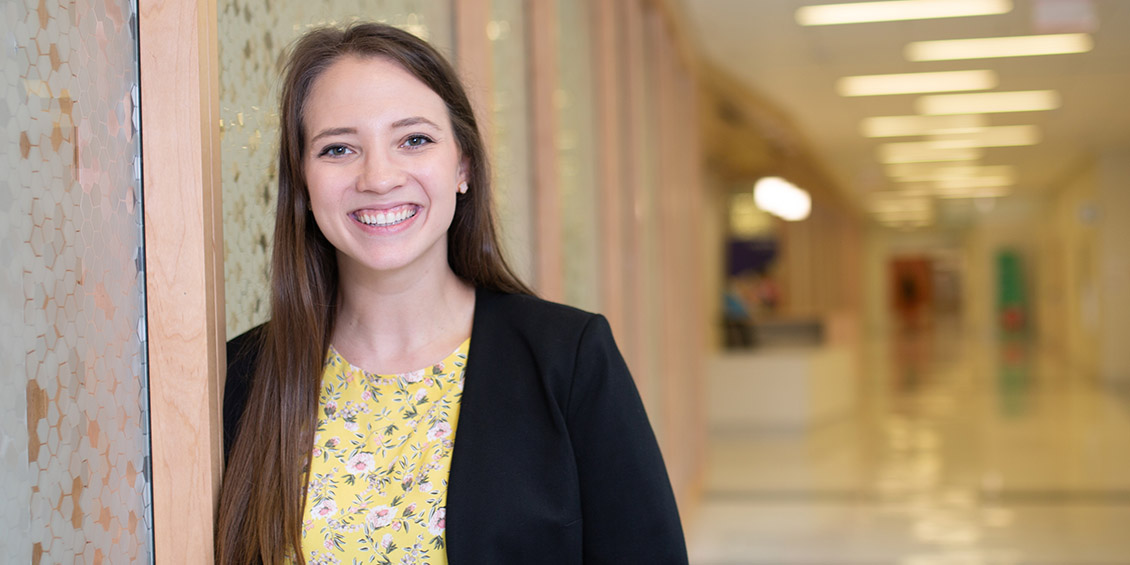Research News
Clearer Communication Wins the Day
Pharm.D. Student Wins Best Pharmacy Abstract, Presents Professional CE for Project Aimed at Improving Oncology Drug Information for Pediatric Patients, Caregivers
September 30 — Pharm.D. student Kristen Underbrink's collaborative work at a Houston pediatric oncology center to improve communication with patients and caregivers about potential side effects from chemotherapeutics and other treatment plan drugs received national recognition by the Children's Oncology Group (COG) at the organization's Annual Meeting Sept. 10-13 in Atlanta, Ga.
Underbrink, who volunteered to work on the project with clinical staff at Texas Children’s Cancer and Hematology Centers (TXCH) and faculty members in the Baylor College of Medicine (BCM) Department of Pediatrics, won the Best Pharmacy Abstract in Pediatric Oncology at the COG meeting. Underbrink was one of two finalists invited to present their projects as part of a pharmacy continuing education session at the meeting.
COG, a National Cancer Institute-supported clinical trials group, is the world’s largest organization devoted exclusively to childhood and adolescent cancer research. The COG unites more than 9,000 experts in childhood cancer at more than 200 leading children’s hospitals, universities, and cancer centers across North America, Australia, New Zealand, and Europe in the fight against childhood cancer.
Underbrink reached out to Brooke Bernhardt, Pharm.D., M.S. (’13), who serves as an assistant professor of pediatrics-hematology/oncology at Baylor College of Medicine and pharmacy director of the Texas Children's Global Hematology Oncology Pediatric Excellence (HOPE) Program, regarding opportunities to gain exposure to the specialty care environment in which she hopes to practice.
Bernhardt had the perfect project in mind: work with a consent education committee to standardize the drug information sheets provided to oncology patients and their caregivers.
Presented in lay language, the sheets serve as a reference for patients and caregivers prior to initiating (and throughout) treatment. The sheets, which are based on a Cancer Therapy Evaluation Program (CTEP) template of the National Cancer Institute, are intended to help in the decision-making process as well as both prepare patients and caregivers of what to expect in terms of the occurrence and severity of side effects from specific therapeutics.
"Typically, they're not just getting one drug – it's five or six drugs, so it's important for them to have these resources that they can take home and absorb, when they're not 'in the moment,' and better assess the care team's recommendations," Underbrink said.
In addition to Underbrink and Bernhardt, coauthors of the project presentation were Quinn Franklin, M.S., CCLS, assistant director of the Psychosocial Division at TXCH; Pat Wills Bagnato, MSN, APRN, CPNP, CPHON®, assistant professor of Pediatric Hematology-Oncology at BCM and TXCH; and Karen R. Rabin, M.D., Ph.D., associate professor of Pediatric Hematology-Oncology at BCM and TXCH.
The project resulted in the development of more than 50 information sheets, which are currently being reviewed for clarity and accuracy by caregivers and clinicians.
"The process of participating in a project that will directly impact patients and their caregivers – and see people recognize and appreciate that effort – was an amazing feeling," Underbrink said.
